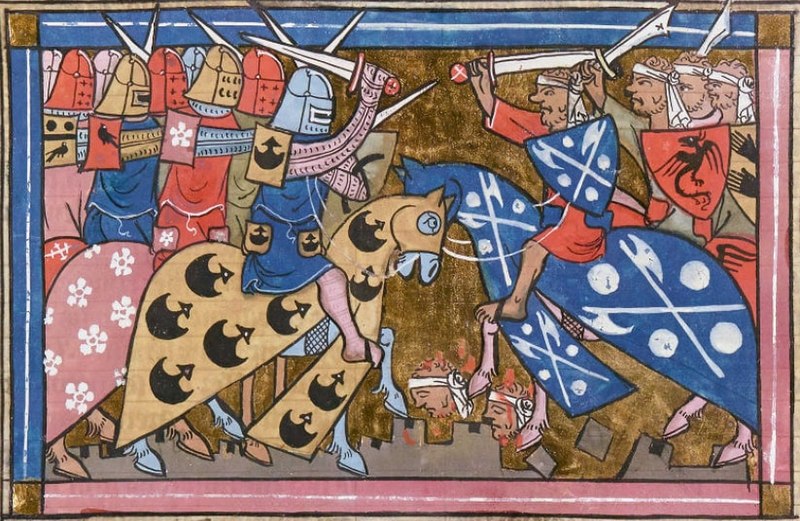A horrific new war involving Israel and Gaza evokes the old subject of war and religion. Doesn’t religion cause most of the conflict in the world? It is widely believed that it does. Prominent neuroscientist and author Sam Harris wrote that religion is “the most prolific source of violence in our history” (The End of Faith, page 27). Another scientist and author, Richard Dawkins, said in a video interview, “There’s no doubt that throughout history religious faith has been a major motivator for war and for destruction.”
In her book Fields of Blood: Religion and the History of Violence (Knopf, 2014), religion scholar Karen Armstrong wrote, “As one who speaks on religion, I constantly hear how cruel and aggressive it has been, a view that, eerily, is expressed in the same way almost every time. ‘Religion has been the cause of all the major wars of history.’ I have heard this sentence recited like a mantra by American commentators and psychiatrists, London taxi drivers and Oxford academics.” It’s an odd remark, she says, especially considering the two massive world wars of the 20th century were not caused by religion.
The much-cited Encyclopedia of Wars (Charles Phillips and Alan Axelrod, Facts on File, 2004) analyzes 1,763 wars of world history, and of those only 123 were judged to have been caused by religion. I haven’t seen the three-volume encyclopedia myself and cannot comment on the authors’ conclusions. But that accounts for less than 7 percent of all wars. A more recently published five-volume Encyclopedia of War (Gordon Martel, ed., Wiley, 2011) labelled only 6 percent of wars as “religious wars.” So there does appear to be skepticism among historians about the relationship between war and religion.
Why Are There Wars?
The current war in Israel and Gaza has obvious religious connections. There are many people commenting on it in media who are much more knowledgable than I am, however, so I am not going to address this war specifically. Let’s consider instead the relationship between war and religion in general.
Wars are complicated and often arise from a multitude of causes. Historians often disagree robustly about what those causes are. But there is broad agreement that more wars have been fought over territory than any other reason. One survey of wars from 1648 to 1989 by political science scholar Kalevi J. Holsti found that territory and boundary disputes were far and away the single biggest cause of those wars. Many wars have been fought to expand empires and colonize weaker nations. And then the “weaker nations” often went to war to establish independence. There are also civil wars fought to overthrow or defend governments. Other motives for going to war include security and access to resources or trade. One historian has argued that nations initiating wars exhibit a national “spirit” that calls for the nation to increase its standing in the world, or to extract revenge. That certainly does seem to describe the military aggression of Japan and Germany in the 1930s.
Where religion is a factor, it is often more a supporting factor than a primary one. For example, in earlier centuries country X may have persuaded itself that it was entitled to colonize country Y, to subjugate its people and exploit its resources, because the people of country Y worshipped the wrong God. We can convert them to the proper religion as we send them to work in mines or on plantations to make money for us, country X might have thought. But had country Y no resources worth exploiting, would country X have bothered? History says no.
War and Religion: A Myth?
In his book The Myth of Religious Violence: Secular Ideology and the Roots of Modern Conflict (Oxford University Press, 2009), author William T. Cavanaugh defines the myth of religious violence as “the idea that religion is a transhistorical and transcultural feature of human life, essentially distinct from ‘secular’ features such as politics and economics, which has a peculiarly dangerous inclination to promote violence.” In truth, religions merge into cultures in many ways, and often the closer one looks the harder it is to find clear, bright lines between what is “religious” and what is “secular.” There is no consistent transhistorical and transcultural thing called “religion.” Cavanaugh continues,
I argue that, in what are called “Western” societies, the attempt to create a transhistorical and transcultural concept of religion that is essentially prone to violence is one of the foundational legitimating myths of the liberal nation-state. The myth of religious violence helps to construct and marginalize a religious Other, prone to fanaticism, to contrast with the rational, peace-making, secular subject. This myth can be and is used in domestic politics to legitimate the marginalization of certain types of practices and groups labeled religious, while underwriting the nation-state’s monopoly on its citizens’ willingness to sacrifice and kill. In foreign policy, the myth of religious violence serves to cast nonsecular social orders, especially Muslim societies, in the role of villain.
In short, a “secular” nation tells itself that their violence is “religious” and therefore irrational and fanatical. “Our violence, being secular, is rational, peace making, and sometimes regrettably necessary to contain their violence. We find ourselves obliged to bomb them into liberal democracy,” Cavanaugh said.
In the case of the Middle East, most westerners know very little of the geopolitical upheavals in the region over the past century or so that have left it unstable. So it’s easy to just blame Islam for Middle East violence. But it truth it’s a lot more complicated than that.
Good vs. Evil; Us vs. Them
Our notions of what constitutes “good” and “evil” may come from religion but certainly aren’t confined to religion or religious people. I once wrote in another context,
People are seduced into evil because they don’t recognize evil as evil. They mistake it for justice, or righteousness, or even God’s Will. And the seduction begins with the thought that “I’m a good person,” and “his hatred of me is evil, but my hatred of him is justified.” As soon as we identify ourselves as “good” and the Other, whoever they are, as “evil,” we’ve well on the way to giving ourselves a cosmic permission slip to do whatever we want to be rid of them. You see the problem.
Inasmuch as religious identity contributes to tribalism and religion to judgmentalism, then religion certainly is a cause of violence and oppression. But tribalism and judgmentalism can and do thrive very nicely without religion. And, ironically, the tendency toward tribalism and judgmentalism often do override the actual doctrines of religion. “Judge not, that ye be not judged,” anyone? It’s also the case that clergy, being human beings, can fall into the same passions and social/psychological rabbit holes as laypeople. And so religious institutions often do support wars. They just don’t tend to be primary causes of most of them.
War and Religion: The Deep Impulses of Violence
People are roused to war and violence by a host of social and psychological factors. There are volumes of studies showing that people who feel without purpose, who lack strong social connections, and who are alienated from their societies, are easily recruited into violent mass movements. The mass movement may package itself as a religious one and co-opt religious symbols and texts, or it may not. But the deeper motivation toward violence will have little to do with anything that any religion teaches.
At the same time, people who are well integrated into their cultures and enjoying their lives with a rich network of family and friends, are not going to become terrorists just because clergy or some cherry-picked bit of scripture tells them to wage a holy war. This is true even if they are devoutly religious. Motivating mature and psychologically stable people to fight, whether they are religious or not, usually requires persuading them that their survival depends on it. And even then, they may not be very good at it. In Fields of Blood, Karen Armstrong writes of a post World War II survey of combat infantry veterans. A majority admitted they couldn’t bring themselves to fire directly at a visible enemy soldier.
In Fields of Blood, Armstrong writes that war “is a means of surrender to reptilian ruthlessness, one of the strongest of human drives, without being troubled by the self-critical nudges of the neocortex.” Certainly those who commit atrocities, especially to children, have surrendered to the reptile brain. Author-philosopher Sam Keen also demonstrated in Faces of the Enemy: Reflections of the Hostile Imagination (1986) that a nation or movement at war will use imagery to portray the enemy as a dehumanized monster, making them easier to kill. Any human is susceptible to this sort of psychological re-wiring, I suspect, whether religious or not.
War and Religion: Conclusions
At the same time, wars tap into deeply ingrained cultural patterns of myth and religiosity. Sam Keen quotes cultural anthropologist Ernest Becker, who said,”If there is one thing that the tragic wars of our time have taught us it is that the enemy has a ritual role to play by means of which evil is redeemed. All wars are conducted as ‘holy’ wars in the double sense then—as revelation of fate, a testing of divine favor, and as a means of purging evil from the world.” He said this long before the September 11 terrorist attacks, after which President George W. Bush explicitly promised to rid the world of evil. “Our responsibility to history is already clear: to answer these attacks and rid the world of evil,” he said.
He may have fallen a tad short. But I well remember President Bush’s cause was supported by at least some anti-theists like Christopher Hitchens. It may be that atheists are just as susceptible as anyone else to mythic calls of heroism and redemption. And, of course, there have been times in history where terrible violence really was instigated by religious passions. It’s just that such violence is more the exception than the rule.
This is a genuinely huge subject, and I know I’ve barely touched the surface of it. I may revisit it in the future. Regarding the Israel-Gaza war: Those of us watching from a safe distance, who are not lost in bottomless grief or facing imminent death, can at least try to not add to the anger and misinformation spreading around the globe. If your religious practice includes prayer, pray for all who suffer. And pray for peace.














